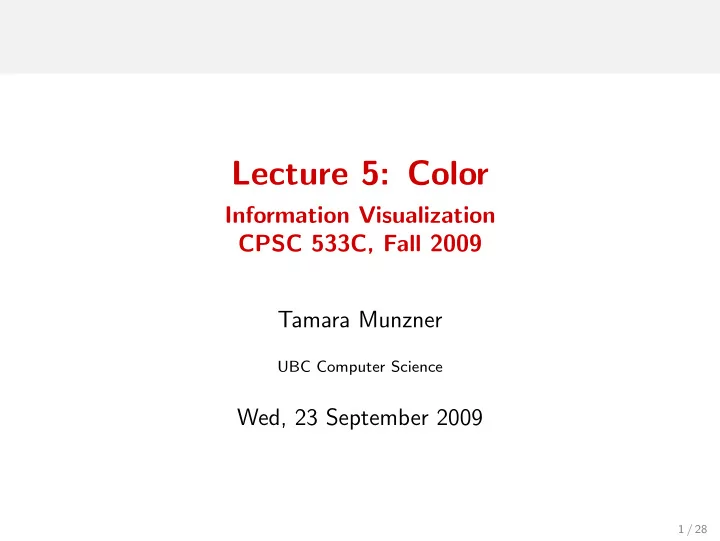

Lecture 5: Color Information Visualization CPSC 533C, Fall 2009 Tamara Munzner UBC Computer Science Wed, 23 September 2009 1 / 28
Papers Covered Representing Colors as Three Numbers, Maureen Stone, IEEE CG&A 25(4):78-85, Jul 2005. http://www.stonesc.com/pubs/Stone%20CGA%2007-2005.pdf Ware, Chapter 3: Lightness, Brightness, Contrast, and Constancy Ware, Chapter 4: Color Tufte, Chapter 5: Color and Information How Not to Lie with Visualization, Bernice E. Rogowitz and Lloyd A. Treinish, Computers In Physics 10(3) May/June 1996, pp 268-273. http://www.research.ibm.com/dx/proceedings/pravda/truevis.htm 2 / 28
Further Reading A Field Guide To Digital Color, Maureen Stone, AK Peters 2003. Face-based Luminance Matching for Perceptual Colormap Generation. Gordon Kindlmann, Erik Reinhard, Sarah Creem. IEEE Visualization 2002. http://www.cs.utah.edu/ ∼ gk/papers/vis02 Color use guidelines for data representation. C. Brewer, 1999. http://www.personal.psu.edu/faculty/c/a/cab38/ColorSch/ ASApaper.html 3 / 28
Trichromacy different cone responses area function of wavelength for a given spectrum multiply by response curve integrate to get response [Stone, Representing Color As Three Numbers, CG&A 25(4):78-85, www.stonesc.com/pubs/Stone%20CGA%2007-2005.pdf ] 4 / 28
Metamerism brain sees only cone response different spectra appear the same [Stone, Representing Color As Three Numbers, CG&A 25(4):78-85, www.stonesc.com/pubs/Stone%20CGA%2007-2005.pdf ] 5 / 28
Metamerism Demo [www.cs.brown.edu/exploratories/freeSoftware/repository/edu/brown/cs/exploratories/ applets/spectrum/metamers java browser.html] 6 / 28
Color Matching Experiments [Stone, Representing Color As Three Numbers, CG&A 25(4):78-85, www.stonesc.com/pubs/Stone%20CGA%2007-2005.pdf ] 7 / 28
Color Matching Functions Stiles-Burch, negative lobe CIE standard, all positive [Stone, Representing Color As Three Numbers, CG&A 25(4):78-85, www.stonesc.com/pubs/Stone%20CGA%2007-2005.pdf ] 8 / 28
Spectral Sensitivity [Joy of Visual Perception, Peter Kaiser. http://www.yorku.ca/eye/photopik.htm] 9 / 28
Color Constancy relative judgements [courtesy of John McCann, from Stone 2001 SIGGRAPH course graphics.stanford.edu/courses/cs448b-02-spring/04cdrom.pdf] 10 / 28
Color Constancy relative judgements [courtesy of John McCann, from Stone 2001 SIGGRAPH course graphics.stanford.edu/courses/cs448b-02-spring/04cdrom.pdf] 11 / 28
Color Constancy relative judgements [courtesy of John McCann, from Stone 2001 SIGGRAPH course graphics.stanford.edu/courses/cs448b-02-spring/04cdrom.pdf] 12 / 28
Color Constancy relative judgements [courtesy of John McCann, from Stone 2001 SIGGRAPH course graphics.stanford.edu/courses/cs448b-02-spring/04cdrom.pdf] 13 / 28
Color Constancy relative judgements [courtesy of John McCann, from Stone 2001 SIGGRAPH course graphics.stanford.edu/courses/cs448b-02-spring/04cdrom.pdf] 14 / 28
Color Constancy relative judgements [courtesy of John McCann, from Stone 2001 SIGGRAPH course graphics.stanford.edu/courses/cs448b-02-spring/04cdrom.pdf] 15 / 28
Coloring Categorical Data 22 colors, but only 8 distinguishable 16 / 28 [www.peacockmaps.com, research.lumeta.com/ches/map]
Coloring Categorical Data discrete small patches separated in space limited distinguishability: around 8-14 channel dynamic range: low choose bins explicitly for maximum mileage maximally discriminable colors from Ware maximal saturation for small areas [Colin Ware, Information Visualization: Perception for Design. Morgan Kaufmann 1999. Figure 4.21] 17 / 28
Minimal Saturation For Large Areas avoid saturated color in large areas ”excessively exuberant” [Edward Tufte, Envisioning Information, p.82] [Colin Ware, Information Visualization: Perception for Design. Morgan Kaufmann 1999. Figure 4.20] 18 / 28
Minimal Saturation For Large Areas large continouous areas in pastel diverging colormap (bathymetric/hypsometric) [Tufte, Envisioning Information, p. 91] 19 / 28
Color Deficiency deutanope protanope has red/green deficit 10% of males! tritanope has yellow/blue deficit http://www.vischeck.com/vischeck test your images use this with your final projects! 20 / 28
Color Deficiency Examples: vischeck original deuteranope protanope tritanope [www.cs.ubc.ca/ ∼ tmm/courses/cpsc533c-04-spr/a1/dmitry/533a1.html, citing Global Assessment of Organic Contaminants in Farmed Salmon, Hites et al, Science 2004 303:226-229.] 21 / 28
Designing Around Deficiencies red/green could have domain meaning then distinguish by more then hue alone redundantly encode with saturation, brightness original deuteranope protanope tritanope [Courtesy of Brad Paley] 22 / 28
Coloring Ordered Data innate visual order greyscale/luminance saturation brightness unclear visual order hue 23 / 28
Rainbow Colormap Advantages low-frequency segmentation the red part, the orange part, the green part, ... [Rogowitz and Treinish, Why Should Engineers and Scientists Be Worried About Color? http://www.research.ibm.com/people/l/lloydt/color/color.HTM] 24 / 28
Rainbow Colormap Disadvantages segmentation artifacts popular interpolation perceptually nonlinear! one solution: create perceptually linear colormap but lose vibrancy [Kindlmann, Reinhard, and Creem. Face-based Luminance Matching for Perceptual Colormap Generation. Proc. Vis 02 www.cs.utah.edu/ gk/lumFace] 25 / 28
Non-Rainbow Colormap Advantages high-frequency continuity interpolating between just two hues [Rogowitz and Treinish, How NOT to Lie with Visualization, www.research.ibm.com/dx/proceedings/pravda/truevis.htm] 26 / 28
Segmenting Colormaps explicit rather than implicit segmentation [Rogowitz and Treinish, How NOT to Lie with Visualization, www.research.ibm.com/dx/proceedings/pravda/truevis.htm] 27 / 28
Cartographic Color Advice, Brewer http://www.colorbrewer.org [Brewer, www.personal.psu.edu/faculty/c/a/cab38/ColorSch/Schemes.html] 28 / 28
Recommend
More recommend